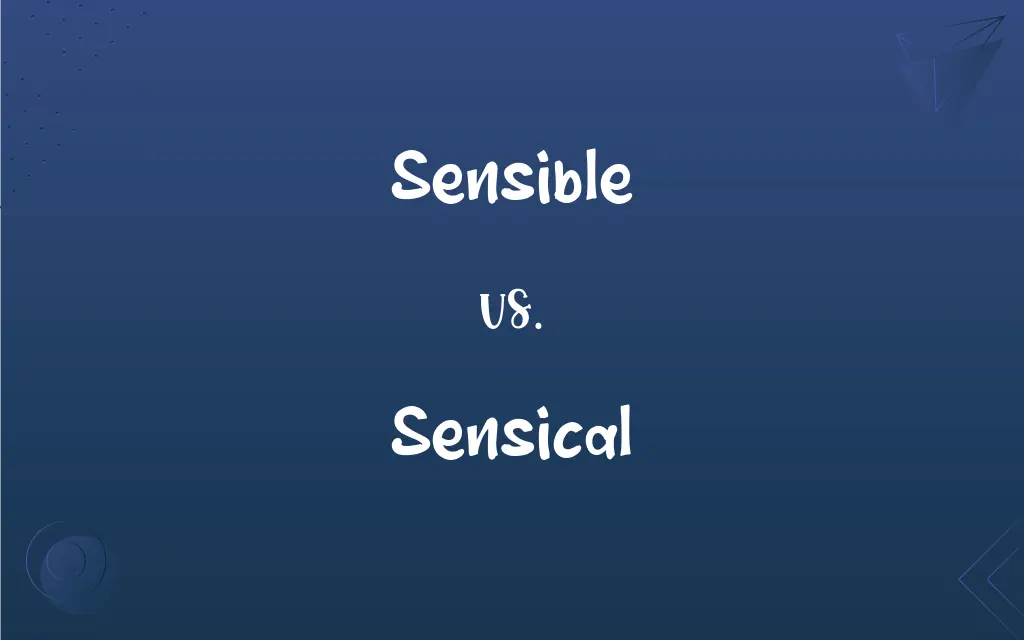Sensible vs. Sensical: What's the Difference?
Edited by Aimie Carlson || By Janet White || Updated on February 15, 2024
Sensible refers to something practical or reasonable, while sensical is a less common term that means making sense or being logical.

Key Differences
Sensible is a commonly used adjective that describes something or someone showing good judgment or practicality. On the other hand, sensical is a less frequently used term that means something is logical or makes sense.
When something is described as sensible, it implies that it is rational and based on sound reasoning. Sensical, although similar in meaning, is more often used to emphasize that something is coherent or understandable.
Sensible decisions or actions are often associated with wisdom and prudence, suggesting a thoughtful and considered approach. In contrast, describing something as sensical focuses on its logical consistency or intelligibility.
The word sensible is more established in the English language and has a broader range of applications, including practicality in fashion, finance, and decision-making. Sensical, while understood, is less commonly used and more narrowly focused on the aspect of making sense.
Both sensible and sensical relate to logic and reason, sensible has a wider scope encompassing practicality and judiciousness, whereas sensical is more specifically concerned with coherence and logicality.
ADVERTISEMENT
Comparison Chart
Common Usage
Widely used in various contexts
Less commonly used
Connotation
Implies practicality and good judgment
Focuses on logical consistency
Application
Broad (e.g., decisions, actions, fashion)
Narrow (mainly related to logical coherence)
Implication
Suggests wisdom and prudence
Emphasizes understandability
Origin
Derived from the Latin "sensibilis"
Derived from "sensical" by adding "-ical"
ADVERTISEMENT
Sensible and Sensical Definitions
Sensible
Reasonable or logical.
Her arguments were sensible and convincing.
Sensical
Coherent or intelligible.
She struggled to form a sensical response under pressure.
Sensible
Designed for practicality rather than appearance.
She wore sensible shoes for the hike.
Sensical
Making sense; logical.
His explanation was the only one that seemed sensical.
Sensible
Aware of and responsive to sensory stimuli.
After the accident, he was barely sensible to pain.
Sensical
Based on sound reasoning.
His decision was not only emotional but also sensical.
Sensible
Perceptible or appreciable.
There was a sensible difference in the room's temperature.
Sensical
Consistent with common sense.
It's sensical to check the weather forecast before going out.
Sensible
Showing good judgment or practical understanding.
It's sensible to save money for emergencies.
Sensical
Rational or understandable.
The theory was complex, but his presentation made it sensical.
Sensical
(rare) That makes sense; showing internal logic; rational, sensible.
FAQs
Can something be sensible but not sensical?
Generally, if something is sensible, it is also sensical, as both imply logic and reason.
Is sensible commonly used?
Yes, sensible is a widely used term in various contexts.
What does sensible mean?
Sensible means showing good judgment or practical understanding.
Is sensical a common term?
No, sensical is less commonly used compared to sensible.
Can something be sensical but not sensible?
Yes, something can be logically consistent (sensical) but not practical or wise (sensible).
What does sensical mean?
Sensical means making sense or being logical.
How can I use sensical in a sentence?
Example: The plot of the movie was hardly sensical, with many inconsistencies.
Can a person be described as sensible?
Yes, a person can be described as sensible if they show good judgment.
What is the origin of the word sensible?
The word sensible is derived from the Latin "sensibilis."
What is the origin of the word sensical?
The word sensical is derived by adding "-ical" to "sensical."
How can I use sensible in a sentence?
Example: It was a sensible decision to bring an umbrella in case it rained.
Are sensible and sensical interchangeable?
They are not interchangeable, as sensible has a broader meaning including practicality, while sensical focuses on logical consistency.
Is sensible used in a positive or negative sense?
Sensible is generally used in a positive sense, indicating wisdom or practicality.
Is sensical used in a positive or negative sense?
Sensical is used in a positive sense, indicating logical consistency.
Can an argument be sensical?
Yes, an argument can be sensical if it is coherent and logical.
Is it sensical to believe in unfounded theories?
No, it is not sensical to believe in unfounded theories as they lack logical consistency.
Can a person be described as sensical?
It's less common, but a person's thoughts or speech can be described as sensical if they are logical.
Can an argument be sensible?
Yes, an argument can be sensible if it is based on sound reasoning.
Is it sensible to plan for the future?
Yes, it is sensible to plan for the future as it shows foresight and practicality.
Can fashion choices be sensible?
Yes, fashion choices can be sensible if they prioritize practicality and comfort.
About Author
Written by
Janet WhiteJanet White has been an esteemed writer and blogger for Difference Wiki. Holding a Master's degree in Science and Medical Journalism from the prestigious Boston University, she has consistently demonstrated her expertise and passion for her field. When she's not immersed in her work, Janet relishes her time exercising, delving into a good book, and cherishing moments with friends and family.
Edited by
Aimie CarlsonAimie Carlson, holding a master's degree in English literature, is a fervent English language enthusiast. She lends her writing talents to Difference Wiki, a prominent website that specializes in comparisons, offering readers insightful analyses that both captivate and inform.
































































